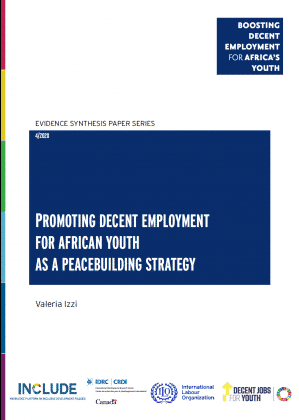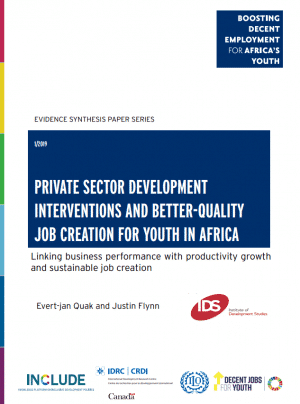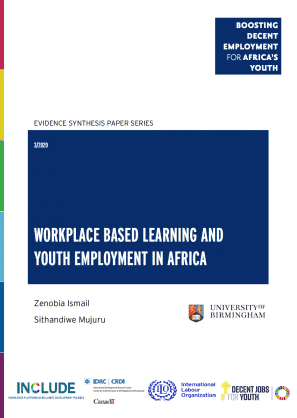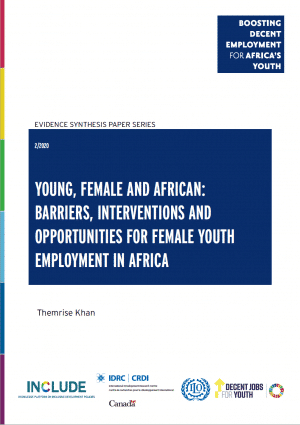
In the frame of the ‘Boosting decent employment for Africa’s youth’ partnership between INCLUDE, IDRC and ILO, under the umbrella of the Global Initiative on Decent Jobs for Youth, a series of evidence synthesis papers will be released in the coming years. Led by INCLUDE, these papers will take stock of existing evidence on themes relevant to the youth employment debate. This fourth paper in the series was prepared by Valeria Izzi. ‘Promoting Decent Employment for African Youth as a Peacebuilding Strategy’. The paper sets out to address two main research questions:
1. How does the quality of work play out in the employment/peacebuilding connection?
2. Can a focus on decent work strengthen the impact of youth employment programmes on peacebuilding?
Youth employment programmes are commonly used as a tool to promote peacebuilding in many post-conflict and fragile settings. Yet, despite their popularity, evidence of impact is scant. These disappointing results cannot be blamed only on contextual factors and implementation challenges. Programmes have long been based on the assumptions of a straightforward correlation between employment and security. It is increasingly evident that a narrow focus on employment status is reductive, and that there are other factors at play. In particular, the quality of jobs may be a more relevant variable compared to the employed/unemployed dichotomy. This paper sets out to explore this hypothesis in relation to Africa, with a view to establishing whether a stronger emphasis on decent work in ‘youth employment for peacebuilding’ programmes can be reasonably expected to bear more impactful results than it has been the case so far.
Author’s main message
Programmes do not happen in sterile lab conditions: they become strongly intertwined with the local political economy context. Who gets which jobs, and how, is just as important, from a peacebuilding perspective, than the overall quantity of jobs created.
Key findings
- For most young people in Africa, the problem is mostly one of ‘bad jobs’ rather than inactivity. Quality of work is therefore a crucial variable to explain the connection between employment and peacebuilding.
- While violence flourishes in areas that are relatively deprived (including in terms of quantity and quality of jobs), this does not explain individual decisions to participate (or not) in violence. Macro-level considerations have limited analytical and predictive power at the individual level. This poses a key challenge for programmes that are based on selecting beneficiaries based on individual characteristics such as ‘vulnerability’ and ‘risk’.
- Employment impact and peacebuilding impact are not one and the same, nor are they necessarily mutually reinforcing. Employment for Peacebuilding programmes are not simply employment programmes with a peacebuilding add-on: they are a qualitatively different kind of programme, and need to navigate trade-offs between employment and peacebuilding impact.
- It is important to distinguish between impact on programme participants and impact for society at large. Even if an intervention is successful in improving the situation of its participants, this may not necessarily translate into benefits for the whole of society, and non-participants may even suffer as a result. The logical gap between ‘employment for some’ and ‘peace for all’ is probably the greatest conundrum facing Employment for Peacebuilding programmes.


